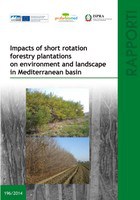Impacts of short rotation forestry plantations on environment and landscape in Mediterranean basin
The expression SRF describes forest systems for biomass production (for energy purposes among others) using fast-growing tree species grown at denser spacing and elevated maintenance than in traditional forestry, typically harvested after 2 to 25 years depending on the desired end-product. Specifically Short Rotation Forestry (SRF) coppices relates to cultivation system that uses fast growing forest tree species, such as willows (Salix spp.), black locust (Robinia spp.) and poplar (Populus spp.), with ability to resprout from the stump after harvest. SRF coppices are considered promising means to meet the targets set by the EU Directive on Renewable Energy. In these type of forest plantations harvest occurs in short intervals, 2-6 years, and management practices are similar to those of agricultural annual crops than to forestry.
A potential large-scale implementation of SRF plantations will undoubtedly have implications, both positive and negative, on a range of environmental issues. The objective of the report produced by ISPRA within the Proforbiomed project, is to present the potential effects of Short Rotation Coppice (SRC) cultivation on water issues, such as groundwater quality and hydrology, on biological diversity, and on soil issues concerning soil quality, soil organisms, and soil carbon, as well on the landscape of the Mediterranean ecosystems
Publication available only on-line

